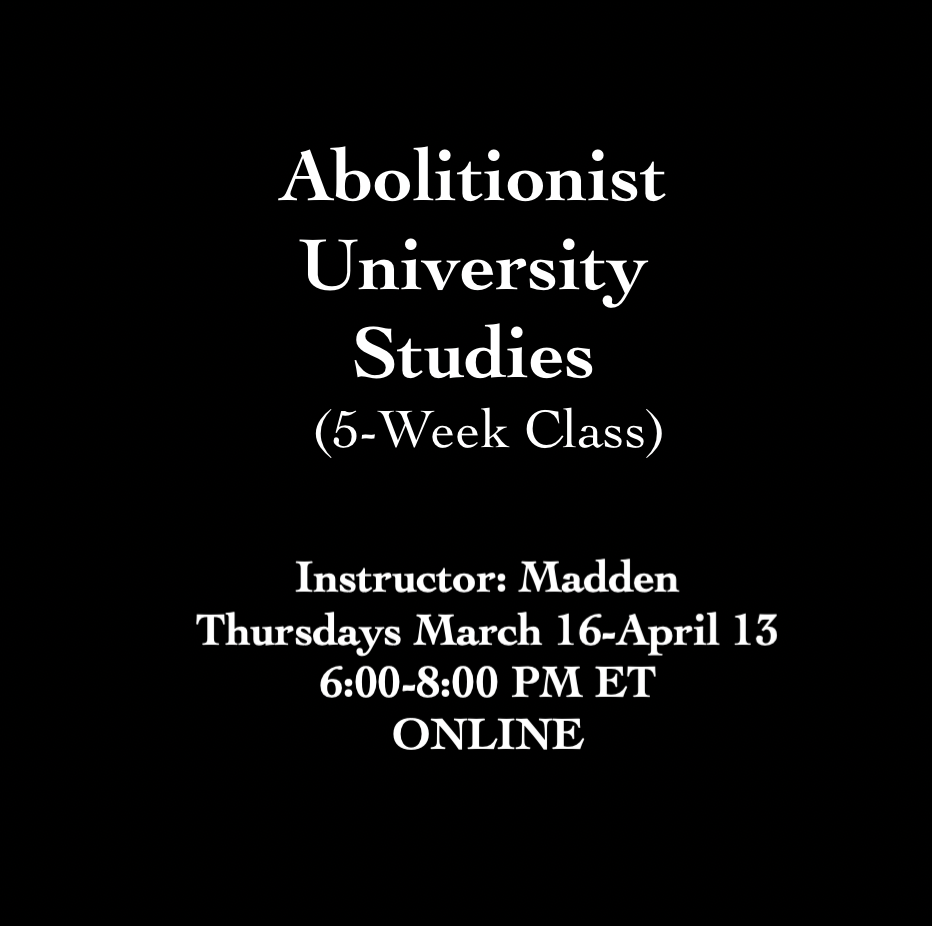 Image 1 of 2
Image 1 of 2

 Image 2 of 2
Image 2 of 2



Abolitionist University Studies
Full Tuition: $300 — Scholarship Options in Drop-Down Menu
Instructor: Madden | 5-weeks | Thursdays March 16-April 13 | 6:00-8:00 PM ET | ONLINE
We begin with a provocation: the university is antagonistic to learning and deep study. Even so, students manage to enter the university and “steal what they can”—taking the knowledge they need and sometimes finding refuge—and many intellectuals are in the university but not of it. Moten and Harney say those things cannot be denied, and it also “cannot be accepted that the university is a place of enlightenment.”
Abolitionist University Studies recognizes that education is regularly positioned as a conduit for job-getting; moreover, education is regularly positioned as the solution to inequality. But as Tressie McMillan Cottom argues, “[college] access is not a panacea.” During our five-week class, we will ask whether we are expecting too much of higher education, and we will center an analysis of the inequalities it reproduces. We will begin with an introduction to Abolitionist University Studies, followed by a broad and far-reaching study of many of the issues animating contemporary higher education, not limited to student loan debt, the demands of university labor organizers, coalitions to get police off campuses, and conservative efforts to control curriculum. The remaining 3 weeks of our course will focus on the most recently published materials expected to shape Abolitionist University Studies. This includes writing on the relationship of universities to slavery as well as the Morrill Act and the theft of Native land. We will also read excerpts from both Julia Schleck’s new work on labor practices and their relationship to academic freedom, and Davarian Baldwin’s new work on the cities that universities inhabit.
Classes are recorded to allow for students to participate asynchronously. If you want to take a class but cannot make the class time, sign up for the asynchronous audit option to follow along on your own. Recordings are password protected and will only be available for the duration of the class and two weeks after it ends.
—
All tuition goes to paying instructors and staff a living wage. We encourage you to pick the payment tier that corresponds with your needs, but ask that you please consider our commitment to fair labor practices when doing so. We are currently able to offer three full scholarships per class, and one full scholarship per person per term. If the scholarship tier you need is sold out or you would like to pay tuition on an installment basis, please email us directly, and we will work with you.
If at any point up to 48 hours before your first class session you realize you will be unable to take the class, please email us and we will reallocate your funds to a future class, to another student’s scholarship, or refund it. After classes begin, we are only able to make partial refunds and adjustments.
Full Tuition: $300 — Scholarship Options in Drop-Down Menu
Instructor: Madden | 5-weeks | Thursdays March 16-April 13 | 6:00-8:00 PM ET | ONLINE
We begin with a provocation: the university is antagonistic to learning and deep study. Even so, students manage to enter the university and “steal what they can”—taking the knowledge they need and sometimes finding refuge—and many intellectuals are in the university but not of it. Moten and Harney say those things cannot be denied, and it also “cannot be accepted that the university is a place of enlightenment.”
Abolitionist University Studies recognizes that education is regularly positioned as a conduit for job-getting; moreover, education is regularly positioned as the solution to inequality. But as Tressie McMillan Cottom argues, “[college] access is not a panacea.” During our five-week class, we will ask whether we are expecting too much of higher education, and we will center an analysis of the inequalities it reproduces. We will begin with an introduction to Abolitionist University Studies, followed by a broad and far-reaching study of many of the issues animating contemporary higher education, not limited to student loan debt, the demands of university labor organizers, coalitions to get police off campuses, and conservative efforts to control curriculum. The remaining 3 weeks of our course will focus on the most recently published materials expected to shape Abolitionist University Studies. This includes writing on the relationship of universities to slavery as well as the Morrill Act and the theft of Native land. We will also read excerpts from both Julia Schleck’s new work on labor practices and their relationship to academic freedom, and Davarian Baldwin’s new work on the cities that universities inhabit.
Classes are recorded to allow for students to participate asynchronously. If you want to take a class but cannot make the class time, sign up for the asynchronous audit option to follow along on your own. Recordings are password protected and will only be available for the duration of the class and two weeks after it ends.
—
All tuition goes to paying instructors and staff a living wage. We encourage you to pick the payment tier that corresponds with your needs, but ask that you please consider our commitment to fair labor practices when doing so. We are currently able to offer three full scholarships per class, and one full scholarship per person per term. If the scholarship tier you need is sold out or you would like to pay tuition on an installment basis, please email us directly, and we will work with you.
If at any point up to 48 hours before your first class session you realize you will be unable to take the class, please email us and we will reallocate your funds to a future class, to another student’s scholarship, or refund it. After classes begin, we are only able to make partial refunds and adjustments.